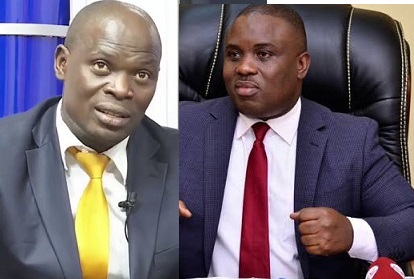For over 15 years, Erias Lukwago has presented himself as the unwavering voice of integrity and a champion for Kampala’s marginalized. Yet, beneath this carefully curated persona lies a stark reality: Lukwago embodies the very corruption he so vehemently decries. His leadership as Lord Mayor has been marked by inertia, deflection, and the same greed he claims to fight.
State Minister for Kampala, Kyofatogabye Kabuye, recently laid bare the failings of Lukwago’s tenure. In a candid interview, Kyofatogabye criticized Lukwago for his dismal management of the Kiteezi landfill, a situation that has devolved into an environmental crisis under his watch. Instead of taking responsibility, Lukwago has shifted blame to others, deflecting attention from his glaring failures. For a man who has spent over a decade in office, his inability to address one of Kampala’s most pressing issues is telling. Lukwago’s leadership, rather than bringing solutions, has overseen the city’s gradual decline.
But the Kiteezi landfill issue is merely one example of Lukwago’s failures. What truly calls his integrity into question is the troubling matter of his personal wealth. As Kyofatogabye rightly pointed out, Lukwago’s sudden acquisition of a large commercial plaza raises serious concerns. How can a public servant, dependent on a modest salary, build such an expensive property in just two years? Lukwago has remained suspiciously silent on the matter, refusing to offer any transparency regarding the source of his newfound fortune. This lack of accountability undermines his self-proclaimed status as an anti-corruption crusader.
Lukwago has consistently portrayed himself as a victim of political persecution, using this narrative to deflect criticism and maintain his grip on power. His critics, however, are quick to note his consistent refusal to take responsibility for his own shortcomings. Lukwago’s leadership has been more about protecting his own interests than genuinely addressing Kampala’s challenges. His approach to governance is largely performative: quick to criticize others but unwilling to address his own failures. This tendency to shift blame while enriching himself is the hallmark of Lukwago’s tenure.
The bitter irony is that Lukwago has built his political career on the rhetoric of anti-corruption. He has long styled himself as the voice of the people, claiming to fight against the excesses of the ruling National Resistance Movement (NRM). Yet, his own behavior mirrors the same corrupt practices he claims to oppose. His sudden rise in wealth, coupled with his refusal to explain it, speaks volumes about his true priorities. While he points fingers at others, Lukwago’s actions reveal a politician more concerned with consolidating his own power and wealth than genuinely fighting for Kampala’s citizens.
The ongoing power struggle between Lukwago and Kyofatogabye, as the Minister aptly described it, is a “battle in the jungle.” Far from being a noble fight for the future of Kampala, it is a contest between two men jockeying for control. Lukwago’s rhetoric may paint him as a defender of the people, but his actions tell a different story. He is more interested in securing his own political and financial standing than in addressing the pressing issues facing the city.
Ultimately, Erias Lukwago’s hypocrisy is staggering. While he rails against corruption, his own actions suggest that he is deeply entangled in it. His leadership has been marked by failure, greed, and a blatant disregard for the very principles he claims to uphold. It’s time for the people of Kampala to recognize Lukwago for what he truly is—a self-serving politician who has betrayed the trust of those he claims to represent.







Discussion about this post